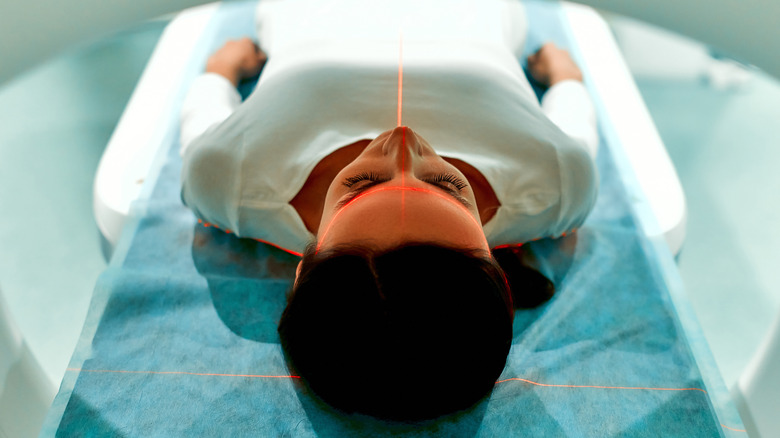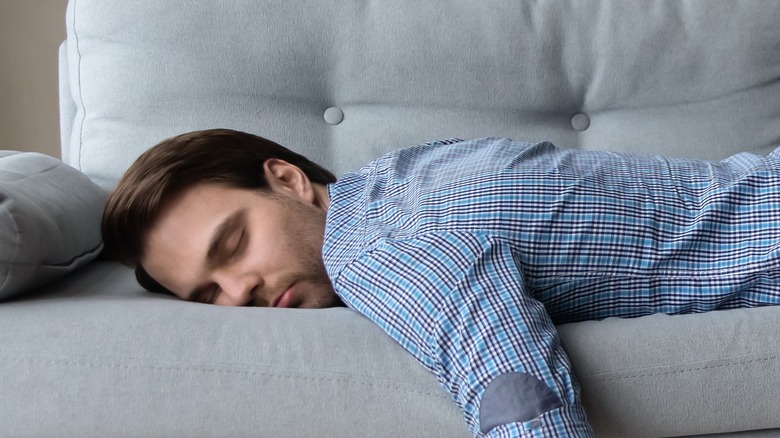Vertigo Explained: Causes, Symptoms, And Treatments
If you've ever experienced vertigo, you know it's not very fun. In fact, it can even be a little scary! That unexpected sensation of spinning — whether it's a feeling coming from inside your own body or a sense that the room you're in has suddenly turned topsy-turvy — is unfortunately a common experience for many folks. You may have felt vertigo while traveling on a boat. Some people experience it even while they're on land, and some go through the ordeal far more frequently than others. The Cleveland Clinic notes that vertigo is quite common in adults: About 40% of folks in the U.S. will feel this sensation at least once in their lifetimes.
At some point, you may have asked yourself: "Why does this feeling occur, and what can I do to keep it from coming back?" In most cases, vertigo isn't so much a condition as it is a symptom (via NHS Inform). Since so many conditions are passed on over generations, you might wonder if vertigo is hereditary. While vertigo itself isn't known to be hereditary, because the symptom can be linked to a range of wide conditions that may run in families, genetic origins can be considered if it is linked to a larger issue (via the Cleveland Clinic).
No matter the cause and origins, vertigo can undoubtedly be frightening. If you're curious about what causes vertigo and how it is commonly treated, you've come to the right place.
How is vertigo different from dizziness?
For many experiencing vertigo for the first time, the sensation can be confusing. It's a fair assumption that everyone has already experienced some form of dizziness in their lifetime, but vertigo can be something new and different for a lot of folks. Which raises the question: How exactly is vertigo different from dizziness?
In most cases, dizziness is a more widely used umbrella term. Dizziness can include a multitude of feelings, including unsteadiness, weakness, lightheadedness, or even a sudden jolt of energy. Vertigo, on the other hand, is a bit more distinct: It is typically used to describe a feeling of spinning (via WebMD). It usually occurs when one has been in a specific position for a long time, and then suddenly moves. Basically, the term "vertigo" pertains to a more specific condition, even though it generally tends to fall underneath the "dizzy" umbrella.
The first bout of vertigo can be quite terrifying for many. Dr. Julie Honaker of the Cleveland Clinic writes: "Vertigo can be very debilitating. It can bring on other symptoms of imbalance too." She also shared that it "comes on so abruptly," and that despite lasting only briefly, it can feel quite intense. Of course, when you begin to feel that spinning sensation more frequently, you should certainly get to the bottom of it by consulting a doctor. So, if you feel something slightly different from dizziness that only lasts for a short while, don't panic, but still consider seeing a medical professional.
The link between vertigo and ear health
If you go to see a medical professional about the possible cause of your vertigo, one of the first things they are likely to check is the state of your ears. Many of the core causes of vertigo stem from your auditory system, whether it's an inner ear infection like labyrinthitis or an inflammation of your vestibular nerve (via NHS Inform). Vertigo may also occur alongside other ear-centered symptoms, such as tinnitus or hearing loss.
It's also important to note the differences between the two main types of vertigo, peripheral vertigo and central vertigo. If the cause of your vertigo is connected to the balance mechanisms in your inner ear, it is categorized as peripheral vertigo. On the contrary, central vertigo is typically the result of issues stemming from different regions of your brain (via NHS Inform).
If you're looking for methods to prevent vertigo, try prioritizing your ear care. For many of us, ear care takes a bit of a backseat to other activities like tooth hygiene and facial care. However, ear care is just as essential, especially as you age. For example, you'll want to avoid inserting cotton buds in your ears, despite the temptation to do so; instead, clean your ears regularly using a washcloth on the outer parts (via WebMD). Seeing an ear, nose and throat (ENT) doctor when you experience vertigo is also a good idea.
Can stress cause vertigo?
If you've been feeling a lot of extra stress lately and experiencing spinning sensations, try some stress reduction as one of your first tactics. That's because hormones like cortisol, which can become elevated with excess or prolonged stress, can actually wreak havoc on your vestibular system, the section of your inner ear responsible for balance (per Healthline). This is why a stressful day can sometimes end with you feeling like you're on a rollercoaster, even though you're just sitting at home on your couch.
It's important not to allow bouts of vertigo to become a common feeling, just because you aren't taking measures to reduce your stressors (per Healthline). Different things work for different people, but some of the most common methods include meditation, exercise, therapy, listening to music, and getting adequate, good-quality sleep. You can also cut back on your coffee, cigarette, or alcohol consumption if you're experiencing stress and/or vertigo. Proper hydration is also key. Even the simple act of sitting down until your vertigo subsides can be a great help. Lastly, if your vertigo is recurring or takes a long time to subside, you should see a medical professional.
Check your meds for vertigo as a side effect
From antibiotics to rheumatology to cardiovascular drugs, many of the most commonly prescribed prescriptions list vertigo as one of their top side effects (per Medsafe). While prescription medications, in many instances, are certainly essential and life-saving, there may be more minor conditions you're taking medications for that could be halted, or perhaps reduced, if you employ other measures.
Also, note the possibility of ototoxicity — a condition where a person develops hearing or balance issues from certain medications — and its potential link to permanant hearing loss. The American Speech-Language-Hearing Association states that there are nearly 200 medications that can wreak havoc on your hearing and balance (and potentially cause vertigo). Be sure to check your medications for this possibility.
Sometimes, a doctor can help you taper down on a vertigo-triggering medication and switch to another that may have fewer vertigo-causing side effects. Talk to him or her and ask if there are alternatives that don't list vertigo as a potential side effect. Additionally, when you consult a medical professional, bring along any prescriptions you may be taking, so you can double-check together. Lastly, consider that the various types of potentially ototoxic medication may include ones you didn't think or expect could be ototoxic. Thus, be sure to mention every single medication you take when your doctor asks you to provide such information.
Migraine headaches and vertigo
It's possible to experience a headache or migraine before, after, or during a vertigo sensation. Vestibular migraines feature vertigo as a prominent symptom (per Migraine Trust). Vertigo can also be a symptom of a specific type of migraine called a basilar migraine. This condition is more serious, but quite rare (via MedicalNewsToday).
If you're experiencing pain or pressure in conjunction with your vertigo, you might want to see an ENT (ear, nose, and throat) doctor to examine your ears and sinuses, check for infections, and try to make connections between your vestibular migrainous symptoms. He or she may also refer you to a neurologist.
It's also worth looking into what's causing your headaches. For instance, some may suffer from headaches due to stress, so try to reduce or eliminate your stress sources. For some, it might be food-based triggers that cause the resulting migraines (per WedMD). For others, it might be eye strain and too much blue light from digital screens (via Healthline). Regardless of the cause, though, it's worth talking to a qualified neurologist or headache specialist to brainstorm ways to reduce your vestibular headaches. If the headaches go away, perhaps that topsy-turvy feeling will go away for good, too.
If your vertigo persists, an MRI scan could help
While it's not unusual for vertigo to strike on occasion, if the feeling persists or increases in frequency, it's a good idea to consult a healthcare professional or specialist who can investigate the root cause of your vertigo. Unlike a broken limb or a bruised body part, however, vertigo is not something your medical professionals can investigate or solve just by looking at you. Thus, based on your doctor's recommendation, you may also get an MRI scan (per NYU Langone Health).
An MRI scan can provide a low-to-no-radiation look at your ears, brain, neck, and other body parts that may hold the key to your vertigo, usually in less than an hour. This type of scan can also give you some peace of mind that your vertigo is not the result of a more serious condition. As modern medicine delves deeper into exploring how physical and mental health are connected, there is increasing evidence that stress and anxiety can negatively affect one's physical health (via Healthline). Thus, having answers — or knowing that there is no major health issue connected to your vertigo — may go a long way toward improving your overall condition.
Vertigo caused by BPPV
BPPV (benign paroxysmal positional vertigo) is a common condition, and it's rarely a serious issue (per Mayo Clinic). It can, however, cause all kinds of strange and sometimes scary sensations in your body and brain.
BBPV is most commonly felt with changes in your body's position: think getting up suddenly from sitting or lying down, or when you tip your head forward or backward too quickly. For some, BPPV might just mean a feeling of vertigo or an overarching sensation of dizziness. For other folks, BPPV might also include feelings of nausea or vomiting (which is certainly no fun). Some may even feel restless, or feel that there's "fluid" moving around in their body as they shift positions.
The good news? Aside from BPPV being pretty common, it's usually treatable. Talk to your doctor about it; there are a few tests that can help in diagnosing the condition, including a standard physical exam, electronystagmography (ENG) or videonystagmography (VNG), and MRI scanning.
Try to sleep longer (or work on improving your sleep quality)
Research suggests that there may be a connection between how well you sleep and illnesses that have vertigo as a symptom (per Neuroworks). Basically, sleep quality and length can impact how frequently you experience vertigo. For example, tossing and turning too much while you're sleeping can result in vertigo attacks. It also works the other way around; vertigo can make it very, very hard to get a good night's rest, which will likely take a toll on how well you can function during your waking hours.
With this in mind, there are a number of ways to improve sleep quality and break this cycle (or prevent it from happening in the first place). For some, this might mean practicing mindfulness before bed, reducing screen time, and increasing sleep time (per National Library of Medicine); for others, this can mean simple fixes like elevating your head with different pillow positions or getting up slowly when you rise from bed (via Neuroworks).
You can also see an ENT doctor or vestibular rehabilitation specialist for more ideas or advice, particularly about adopting sleeping positions and habits that can contribute to better sleep.
Talk to your doctor about your vertigo
As is the case with most medical symptoms and conditions, it's always best to consult with a trusted medical professional whenever you experience a new or worsening symptom — and vertigo is no exception.
Vertigo can be caused by something very simple (like your sleeping positions or quality), or perhaps a more serious health issue that you initially weren't aware of (per NYU Langone Health). If left untreated or if the underlying health issue that could be causing it is not identified or addressed, vertigo can have severe repercussions on your day-to-day activities, and even put your life in significant danger. Aside from the fact that vertigo can make even the simplest and most routinary tasks a herculean chore, it can also throw your sense of balance out of whack — annoying when you're just standing or sitting at home, but quite life-threatening when you're driving or crossing a busy intersection.
If your vertigo makes it hard for you to stand even for a short period of time, don't just wait for it to go away. It's wise to promptly pay a visit to the emergency room and have a doctor examine your condition.










